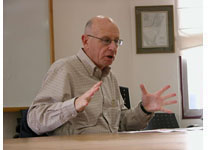Archive
Maybe not ‘anti-Semitic,’ perhaps Time is ‘anti-semantic’
By Bruce S. Ticker
PHILADELPHIA — Editors at Time Magazine may be unfairly accused of anti-Semitism, but they are reckless with their semantics. As experienced journalists, they should understand that misleading language can be dangerous.
The magazine’s Sept. 13 cover headline – “Why Israel Doesn’t Care About Peace” – brought its editors condemnation from supporters of Israel. The Anti-Defamation League slammed the Time article for stressing Israelis’ inclination to make money.
Academy Award-winning actor Jon Voight, a staunch gentile supporter of Israel, called Time “anti-Semitic” because of the headline and its accompanying article inside which contends that Israelis are apathetic toward the peace process with the Arabs.
Karl Vick, the writer, indeed succeeds in reaching this conclusion. Who can blame the Israelis?
Hostilities resulted from the offer of a Palestinian state in 2000 and withdrawal from Gaza in 2005.
Personally, I long ago ceased understanding what Israel gets out of negotiating a pact with Arabs over Israel’s territories.
Vick and his editors made three mistakes. First, a Time spokesman boasted that the article is a scoop. Oh yeah? A Newsweek article reached the same conclusion last January.
The article carelessly states: “They’re otherwise engaged; they’re making money; they’re enjoying the rays of late summer.”
No doubt that claim is factually true for many Israelis, but the phrase “they’re making money” is delicate wording when applied to Jews, who have been stereotyped as greedy throughout the ages.
The most gaping blunder is the headline, which presumes that Israel is apathetic to peace.
“Peace” is not what Israelis need from Arabs in the territories. They already have a relative level of peace within Israel proper. Terrorist bombings from the West Bank ended after the security barrier started going up. Rocket attacks from Gaza and southern Lebanon dwindled after recent military confrontations with Hamas and Hezbollah.
Time would have been more factual, if tedious, had they composed this headline: “Why Many Israelis Don’t Care About Reaching Terms.”
The word “peace” is tossed around too casually in the context of this conflict, and Time is far from alone in committing this offense. “Peace” has evolved as shorthand for a process that is too convoluted to be reduced to a single five-letter word. It allows for a catchy phrase, but Time editors may disdain letting the facts get in the way of a good headline.
The only objective that seems plausible is the handover of land – namely, Gaza and the West Bank – so the Arabs can form their own society. That’s fine, but a treaty will not ensure “peace” and “peace” need not be achieved through a treaty. Even if it agrees to a near-perfect deal, Israel must still worry about Iran’s nuclear designs and the ongoing arms build-up in Gaza and southern Lebanon.
The same obstacles persist – security needs, excessive Arab demands, settler resistance, Hamas’ control of Gaza and right-wing pressures within the Israeli government.
Hawkish advocates for Israel will insist that the West Bank is not peaceful, but what do the settlers expect when they choose to live amid a hostile population? “Peace” can only be accomplished there by removing the settlers, even unilaterally; expelling the Arabs; or negotiating a pact that is fully enforced. Israelis who live in Israel proper care about West Bank “peace” when their sons and daughters in uniform are assigned to protect the settlements.
For the record, it would be valuable if an accord is reached, but it is still a feat that most Israelis can live without…in peace. Violence can erupt at any time, as was the case with riots in east Jerusalem and the murder of four settlers in recent weeks. Even if a “peace” treaty is ever implemented.
*
Ticker is Philadelphia bureau chief for San Diego Jewish World
Palestinians should realize Israel willing to withdraw for peace, settlements or none
By Rabbi Ben Kamin
SAN DIEGO — It’s not hard to agree that the settlement movement in Israel—a hybrid of indigenous religious zealots and immigrant fundamentalists from places like Chicago, Toronto, and Johannesburg—is something of a complication for the peace process. This is true even though the overwhelming majority of Israelis—people making car payments, trying to keep their jobs, and maintain their health benefits—are neither settlers, would-be settlers, or even particularly observant Jews.
The Palestinian obsession with the settlements is peculiar and out-of-touch with a) the far more urgent issue of salvaging their own state (deserved) from a smoldering splinter of terror groups and ostensibly more “moderate” factions that remain in bloody stalemate among each other (primarily Hamas v. Fatah) and b) the more cogent realization that to ask Israel to stop building communities when you haven’t even offered to stop destroying communities is absurd and disingenuous.
The Palestinians, with their funny caveats, and the Obama imposers, with their tongue-clucking demands that Israel “take risks for peace” (as if every single day since Israel was created in 1948 has not been a risk) don’t seem to grasp the bigger picture: Israel is about life and growth and science and creativity.
Over 80% of the nation consists of secularists who watch cable news, shop in trendy malls, love to linger in fashionable coffee shops, drive late-model cars across a national freeway system, and like to travel to Turkey, India, Hong Kong, and North America. They want college, not conflagration. Read more…
The Jews Down Under~Roundup of Australian Jewish News
Compiled by Garry Fabian
Appealing for appeal respect
MELBOURNE, 23 September – Communal organisations
have called into question the effectiveness of the Jewish Community Council of Victoria’s (JCCV) campaign calendar.
Despite paying a large annual sum for the exclusive right to fundraise during certain weeks of the year, groups say this schedule is not being enforced.
Magen David Adom (MDA) has accused a number of community not-for-profits of failing to respect its exclusive appeal period, which falls for a week at the end of August and another at the start of October.
A JCCV affiliate, the Australian arm of the Israeli ambulance service like other organisations pays to guarantee a sole fundraising window. However, it claims some bodies have not respected its two-week block. Read more…
Massive U.S. arms sales to Middle East
WASHINGTON, D.C. — The Obama administration has announced a $60 billion sale to Saudi Arabia, including include 84 F-15 fighter planes, 70 AH-64 Apache attack helicopters, 72 UH-60 Blackhawk utility helicopters, and 36 MH-6 Little Bird surveillance helicopters. The package also includes HARM anti-radar missiles, more precision-guided JDAM bombs, Hellfire air-to-ground missiles and sophisticated helmet-mounted displays for fighter pilots.
The Financial Times reports that the UAE has just signed military supply contracts for $35-40 billion and that by 2014, Oman is expected to shell out $12 billion and Kuwait some $7 billion for arms, in what the Times calls “one of the largest re-armament exercises in peacetime history.”
In the boilerplate language used to formally notify Congress, the Administration avers that the proposed infusion of arms will not change the balance of power. Indeed, State Department spokesman Philip Crowley said that the United States, “would do nothing that would upset the current balance in the region.”
That’s odd. The introduction of another $60 billion (plus $12 billion, plus $7 billion) in weapons won’t change the balance? Is that because the weapons are useless? Is it because the Saudis can’t use them? Is it because we don’t expect them to use them? Is it because Israel doesn’t mind? Agence France Presse (AFP) did report that, “in deference to Israeli concerns, the Administration did not offer so-called standoff systems, which are advanced long-range weapons that can be attached to F-15s for use in offensive operations against land- and sea-based targets.”
Deference to Israeli concerns requires pointing out that history indicates that sales to Saudi Arabia aren’t the issue. Iran is the issue.
In 2007, Russia signed a deal to sell Iran its S-300 anti-missile system. This week, Russia’s Chief of the General Staff said the missiles are banned under UN Security Council sanctions against Tehran, so the deal will not be consummated – now, but the Russians have been on-again-off-again. On the other hand, Russia is going forward with the sale of P-800 Yakhont cruise missiles to Syria. “These weapons cannot be used to destabilize the region,” said former Russian Foreign Minister Igor Ivanov in a Jerusalem Post story. “Ivanov pointed to ‘provisions in the contract with Syria’ that specifically bar Damascus from transferring these weapons to a third party (Hezbollah), noting that the manufacturers were also only allowed to work on the weapon installation with the Syrians.”
Well, that makes us feel better. After all, UNIFIL ensures that the Syrians don’t share much materiel with Hezbollah. The State Department said, “Opposition to arms sales to state sponsors of terrorism is well known,” but didn’t mention the recent report of Syria and Hezbollah creating a joint military headquarters to orchestrate cooperation between their forces – in addition to the ongoing smuggling.
Countries can try to make any decision look like responsible foreign policy. Russia says “no” to Iran but “yes” to its proxy and partner Syria. Syria is a “state sponsor of terrorism” when the State Department wants to criticize the Russians, but what is it when we provide them with political legitimacy in an effort to “woo” them from Iran? The United States sells Saudi Arabia weapons, but skips over Saudi funding of anti-American mosques and schools in Europe and the United States – the nucleus of jihadist education.
The fact is that Saudi Arabia is unlikely to take on Iran without the United States and is still hoping Israel will remove the Iranian threat, so if we’re selling them “defensive” equipment with that understanding, well, recycling petrodollars isn’t altogether a bad thing. But Iran is a threat to the region with or without nuclear weapons and the problem won’t be solved with $60 billion worth of arms or by complaining about the Russians.
*
Bryen is senior director of security policy of the Jewish Institute for National Security Affairs. Her column is sponsored by Waxie Sanitary Supply in memory of Morris Wax, longtime JINSA supporter and national board member.
Clinton lauds Arab peace initiative on Saudia Arabia’s National Day
WASHINGTON, D.C. (Press Release)–On behalf of President Obama and the people of the United States, I congratulate the Custodian of the two Holy Mosques, King Abdullah bin Abdulaziz al Saud, and the people of the Kingdom of Saudi Arabia on your national day this September 23.
King Abdullah’s leadership on key challenges, from developing the Kingdom’s institutions and economy to establishing an enduring dialogue promoting moderation and tolerance, has put Saudi Arabia and the region on a path towards a stronger, more prosperous, and more secure future. We also honor King Abdullah’s steadfast support for the Arab Peace Initiative. This groundbreaking initiative provided a far-sighted vision for comprehensive regional peace when the King first proposed it. As we continue working to support direct talks between the Israelis and the Palestinians, the principles enshrined in the Arab Peace Initiative are more important than ever.
Our cooperation ranges from science and technology to health and safety – including raising awareness of breast cancer and helping Hajj pilgrims stay healthy – to trade and investment and our shared goal of expanding opportunities for women and youth. We are also working to increase opportunities for student exchanges and to strengthen our educational partnerships, something I discussed with King Abdullah in depth on my visit to Saudi Arabia earlier this year and with the women of Dar Al-Hekma College in Jeddah.
As we join in celebrating this special day, we reaffirm the commitment of the United States to broaden and deepen our partnership with Saudi Arabia in the years to come. I wish all Saudis a safe and joyous National Day.
*
Preceding provided by U.S. State Department






